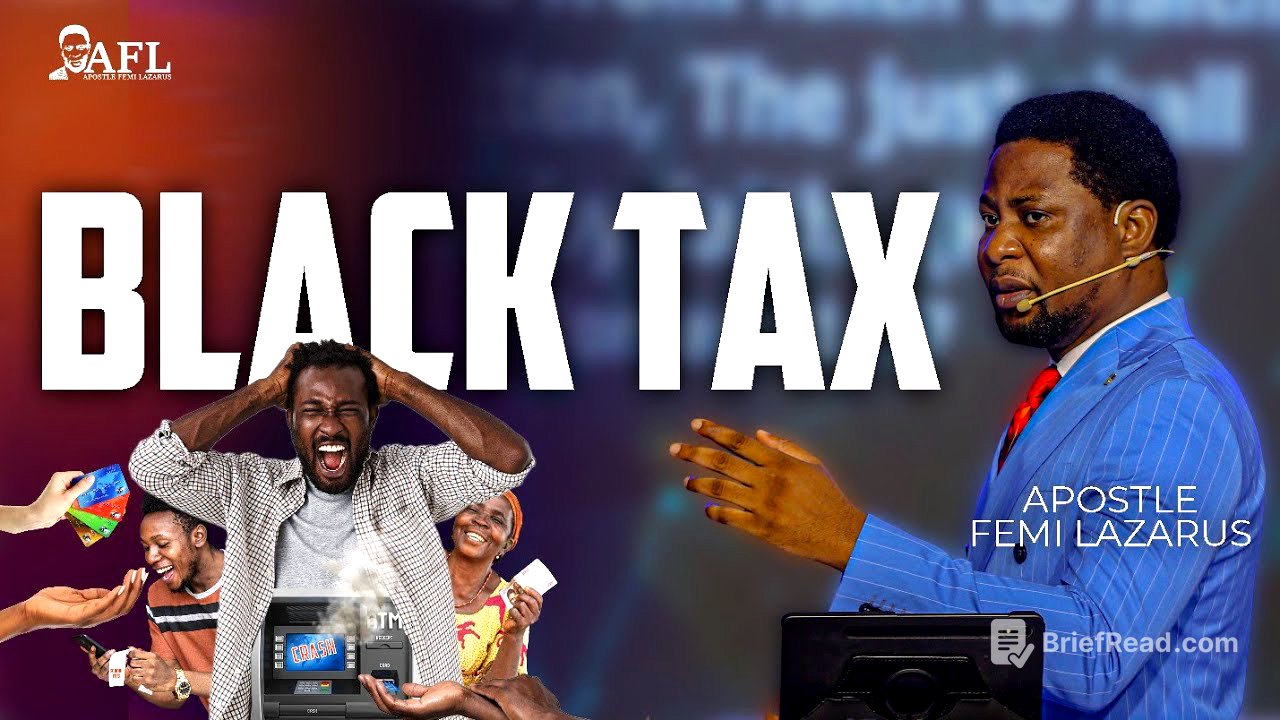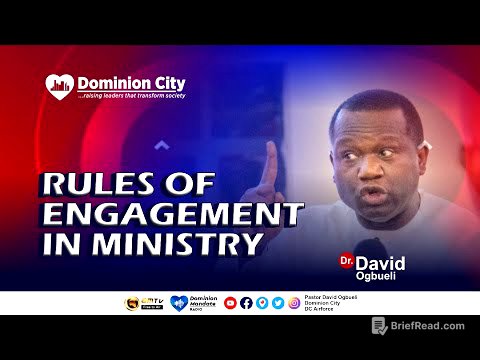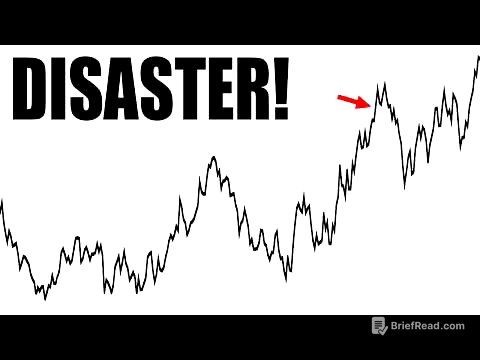TLDR;
This sermon by Apostle Femi Lazarus addresses the concept of "black tax," which refers to the financial burdens placed on successful individuals to support less financially secure family members. He argues that while generosity is scriptural and important, a lack of wisdom and balance in giving can perpetuate a cycle of dependency and hinder overall progress. The sermon encourages listeners to give with wisdom, promote responsibility, and break dysfunctional patterns to build sustainable financial futures for themselves and their families.
- Black tax is a financial burden on successful family members to support less secure ones.
- Generosity is scriptural, but wisdom and balance are essential in giving.
- Lack of financial knowledge and responsibility perpetuate poverty.
- It's important to build sustainable systems and break dysfunctional patterns.
- Givers should prioritise their well-being and immediate family.
Introduction: The Bigger Picture [0:01]
Apostle Femi Lazarus introduces the topic of black tax, clarifying that this series is not just about family relationships but about overhauling culture. He emphasises that God has a larger plan, and addressing family dynamics is crucial for broader societal change. He illustrates this with an analogy of a shoe purchase, highlighting that any system valuing money over customer satisfaction is destined to fail. God aims to address cultural beliefs, and the church is the place for balanced discussions on such issues.
Defining Black Tax and the Crab Culture [2:59]
The speaker defines black tax as the financial burden or responsibility borne by those who have achieved a level of success in their families, requiring them to support less financially secure relatives. He notes that this is particularly prevalent in African cultures. He introduces the concept of "crab culture," where individuals are held back by those around them, preventing them from achieving financial freedom. Without wisdom, this system perpetuates a cycle of everyone remaining at the same level.
The Scriptural Basis for Generosity [6:18]
Apostle Femi establishes the scriptural basis for generosity, referencing Proverbs 19:17, which states that lending to the poor is lending to God. He emphasises that God wants people to give and care for the poor, and that giving is more rewarding than receiving. He stresses the importance of compassion and providing for one's household, but also highlights the need for wisdom and balance in doing so.
The Dangers of Jumping into Responsibilities Without Strength [9:31]
The speaker uses an illustration of people at a swimming pool to explain that people should attain a level of strength before jumping into responsibilities. He warns against building finances on emotions, as problems in life are endless. He shares a story about an NGO recognising the importance of acknowledging that "you can't do everything". He illustrates this with a story of a woman who preferred cash to medical care for her dying son, highlighting that money isn't always the solution to poverty.
The Importance of Knowledge and Wisdom [13:35]
Poverty, according to the speaker, stems from a lack of knowledge. He references Luke 4:18, where Jesus preaches the gospel to the poor, suggesting that information is what's missing. He challenges listeners to reflect on whether their financial generosity has lifted anyone out of poverty. Proverbs 24:3 states that a house is built through wisdom, established by understanding, and filled with riches through knowledge. Financial abundance requires more than just prayer; it requires knowledge.
Taking Responsibility and Avoiding Sentimentalism [16:30]
The speaker criticises the tendency to attribute problems to spiritual forces rather than taking responsibility. He shares anecdotes about a man blaming God for his daughter's death after he beat her and people blaming the devil for a generator malfunction. He insists that Africans are sentimental about many things and put responsibilities on God. He stresses the importance of taking responsibility to change outcomes.
Toxic Generosity and Ego-Driven Giving [20:12]
The speaker shares a story about his brother who wanted money for JAMB, but instead, he paid for him to learn fashion design for a year, then paid for his JAMB fee himself. He warns against generosity that enables irresponsibility. He criticises rewarding irresponsibility, using an example of boys sacked for dancing on duty. He argues that sometimes, giving is driven by ego rather than generosity, particularly in African weddings where parents support to impress their friends.
The Problem with Emotional Decision-Making [23:11]
Apostle Femi quotes Bishop TD Jakes, who believes that the church's problem is being quick to employ and slow to sack, unlike other organisations. He argues that emotions hinder development, using the example of a governor's wife's brother's friend selling paper by the roadside. He advocates for replacing emotions with wisdom and discretion, reiterating that God wants people to give, but with wisdom.
Solving Poverty: More Than Just Releasing Money [24:28]
The speaker argues that solving poverty is not just about releasing money, citing Nigeria's borrowing of billions of dollars to distribute per household. He criticises this approach as clueless and ineffective in bringing people out of poverty. He distinguishes between financial illiteracy and mercy, stating that those who lack financial intelligence often appear merciful but are simply planless.
Black Tax as a Black People Thing and the Oxygen Mask Concept [26:16]
The speaker reiterates that black tax is primarily an African issue, hindering the success of black people in countries like America. He emphasises that one cannot solve a problem they are part of, advocating for detachment to find solutions. He uses the analogy of an oxygen mask on a plane, advising listeners to secure their own mask before assisting others, as failing to do so can lead to both parties perishing.
Generosity and Avoiding Defrauding [28:08]
The speaker reiterates that generosity is scriptural and that God wants people to give and take care of the less privileged. He encourages listeners to have a system of flowing to the less privileged, especially during Christmas. He advises those who have stopped giving due to being defrauded to change the people they help but not to shut their doors of compassion.
Childbirth is Not an Emergency and Demonic Responses [30:11]
The speaker advises that childbirth is not an emergency and that people have nine months to prepare. He also shares a story about a friend who was getting married and how he was expected to pay for everything. He shares that sometimes when you give to people, the only thing they owe you is thanks. He warns against demonic responses and being used, urging listeners not to shut their doors of compassion.
Complications of Black Tax: Trapped with Bills [36:11]
The speaker begins to discuss the complications of black tax, stating that once you get trapped with bills, both necessary and unnecessary, you will not be able to build substantially like your colleagues and you will be left behind. He emphasises that one person cannot solve family problems. He warns that very few people can accept your generosity and still understand that you are giving because you care, not because you have so much.
Scamming Systems and the Importance of Wisdom [37:28]
The speaker shares a personal story of being scammed, highlighting how scammers often target givers. He recounts how he borrowed money to help someone import goods, only to discover it was a scam. He stresses the importance of being careful and not offering to do what you can't afford. He reiterates that few people can deal with the fact that you are giving and respect that you are only doing it because you have a heart.
The Need for Wisdom and Plans [42:58]
The speaker emphasises the need for wisdom in giving, stating that it is kind people who die first in families due to responsibility. He encourages listeners to have plans and givers around them. He asserts that the wrong culture in Africa has made everyone want to survive regardless of who goes down, creating a dysfunctional system. He states that you did not start the problem, you can't end it, but you can help.
Protecting Your Marriage and Breaking Dysfunctional Cycles [45:17]
The speaker warns that there is a way your giving as a man will demonise your wife. He advises those from dysfunctional backgrounds to cut excesses before settling down. He shares a story of a father who told his daughter on her wedding day that two of her siblings would be moving in with her and her husband. He stresses that parenting should continue until children can stand on their own and that someone has to break the cycle of dysfunctionality.
The Belief That Givers Have More Than Enough [49:52]
The speaker explains that many people believe that givers have more than enough, leading to increased demands and responsibilities. He uses the example of rain, an abundant gift from God, being wasted. He argues that many givers create a culture of wastage due to a lack of planning. He suggests that Nigeria needs to study the Jewish culture, particularly the "Esusu" system, for financial stability.
Toxic Generosity and Guilt-Driven Giving [52:45]
The speaker identifies prestige, guilt, and compulsion as reasons for toxic generosity. He addresses the psychological aspect of guilt, where people feel it is a sin to have when others don't. He asserts that God is not cheating on anyone to bless you and that everyone should take responsibility for their outcomes. He warns that feeling guilty for having will lead to manipulation.
Ego and Avoiding Sleepless Nights [56:18]
The speaker criticises the guilt that makes people feel obligated to pay when riding in a car with someone younger. He argues that it's ego, not niceness. He advises against trying to impress people and using money you don't have to buy things you don't need. He encourages listeners to avoid sleepless nights over wedding gowns and receptions, suggesting renting instead.
The Long Month of January and Helping Your Guy [59:18]
The speaker warns against competing with others during Christmas with money you don't have, as January is a long and stubborn month. He shares an observation about a woman still selling "akara" after 10 years, suggesting that the idea of business is to work your way out of it. He asserts that salary is not the route to building wealth.
You Are Not El-Shaddai and the Importance of Self-Care [1:02:12]
The speaker reminds listeners that they are not El-Shaddai (all-sufficient) and should not kill themselves trying to meet everyone's needs. He advises them to take care of their health, check their blood pressure, and eat good food. He criticises those who like "garri" (a poor man's food) despite having money, stating it's poverty they like. He encourages balance and generosity to immediate family.
Survival Mode and Financial Illiteracy [1:05:38]
The speaker notes that in survival mode, money becomes more important than life. He reiterates that everyone will survive if you die and that you are only taking care of challenges because you are alive. He asserts that the money you are throwing around is not necessarily a sign of generosity but of financial illiteracy. He questions whether listeners have a budget, financial goals, investments, or savings.
Financial Policy and the Wisdom of a Builder [1:07:58]
The speaker stresses the importance of having a financial policy and structure beyond oneself. He suggests having accounts that are not easily accessible to prevent foolish spending. He criticises those who break their savings plans repeatedly. He asks how many times listeners have had to cry to God for oxygen or mangoes, highlighting that God designed everything with a cycle of consistent production.
Giving Seed, Not Just Bread [1:10:33]
The speaker encourages listeners to learn from God and give seed, not just bread. Instead of repeatedly paying rent, support a business that can generate recurring income. He explains that God had rest because there was a body of wisdom in charge, creating balanced cycles. He urges listeners to create systems that give them rest.
Standing First Before Extending a Helping Hand [1:13:21]
The speaker emphasises that one must stand firm before extending a helping hand, otherwise, they will drown. He warns that being unable to manage finances can deter potential partners. He advises against giving in a way that fuels irresponsibility and encourages creating a network of support.
Irresponsibility and Rewriting Your Story [1:15:42]
The speaker asserts that anyone who can read and write can make money and encourages listeners to learn skills like graphics design or writing. He shares a story about a photographer who learned a skill while waiting for admission. He urges listeners to rewrite their own stories, as God has given them everything they need. He states that Nigeria will only change when Nigerians become tired of the current situation.
Being Genuine and Creating Structure [1:19:54]
The speaker advises listeners to be genuine and not fake it until they make it. He encourages them to create structure, have family conversations, and share their burdens. He advises against promising what you can't do and to consider your immediate family.
Helping People Do What Is Necessary [1:23:21]
The speaker reiterates that helping people is scriptural, but it's important to ensure you are stepping into what is necessary and not enabling people to take advantage of you. He notes that sometimes people need advice, not money. He concludes by praying for wisdom for listeners to navigate the next phase of their lives and build sustainable systems.









